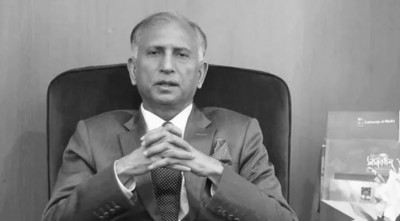The passing of Professor Dr. AAMS Arefin Siddique, former Vice Chancellor of Dhaka University and a revered figure in the field of Mass Communication and Journalism, has left a profound void in the hearts of his students, colleagues, and admirers. His contributions as a teacher, mentor, and administrator have been widely acknowledged, and his legacy as a compassionate educator who prioritised humanity over mere academic achievement remains unparalleled. However, the controversy surrounding the denial of his dead body being brought to Dhaka University for his final farewell has cast a shadow over his dignified departure, raising questions about the politicization of even the most sacred moments of life and death.
Professor Arefin Siddique was not just a teacher; he was a beacon of hope and inspiration for countless students. His ability to connect with students across political and ideological divides, his unwavering commitment to nurturing good human beings, and his gentle yet impactful presence in the classroom earned him respect and admiration from all quarters. His students, many of whom now hold influential positions in society, remember him not just for his academic guidance but for his moral compass and the values he instilled in them. His life was a testament to the idea that education is not merely about degrees but about shaping character and humanity.
Yet, the decision to prevent his dead body from being brought to Dhaka University for his funeral prayers has sparked outrage and disappointment. The university, where he served for over four decades, was not just his workplace but his second home. It was here that he touched countless lives, mentored generations of students, and contributed to the intellectual and cultural fabric of the nation. Denying him a final farewell at the institution he loved and served is not just a disservice to his memory but also a reflection of the deep-seated divisions and petty politics that often overshadow the values of respect and gratitude.
The arguments against bringing his dead body to the university, reportedly led by the current administration, are shrouded in ambiguity. Some suggest it was due to logistical concerns, while others hint at political motivations. Regardless of the reasons, the decision has been perceived as a lack of respect for a man who dedicated his life to the betterment of Dhaka University and its students. It is ironic that a teacher who always advocated for unity, compassion, and humanity was denied the dignity of a farewell that should have been his rightful due.
Criticism of Professor Arefin Siddique’s tenure as Vice Chancellor is not uncommon, as is the case with any administrator. His political affiliations and decisions during his time in office have been subjects of debate, and it is natural for opinions to vary. However, even his critics acknowledge his contributions as a teacher and his unwavering commitment to his students. The fact that students from all political backgrounds came together to mourn his passing is a testament to his ability to transcend partisan divides and earn the love and respect of all.
The university administration’s decision has not only hurt the sentiments of his students and admirers but has also raised questions about the values we uphold as a society. If we cannot honor a teacher of his stature in his final moments, what does it say about our collective conscience? A teacher’s role is to illuminate minds and nurture souls, and Professor Arefin Siddique excelled in this role. Denying him a farewell at his alma mater is a failure to recognise the very essence of what he stood for.
In this moment of grief, it is imperative to rise above petty politics and honor the legacy of a man who dedicated his life to education and humanity. Dhaka University, as an institution, should have been the first to lead this tribute. Instead, it has become a symbol of division and disrespect. The administration must reflect on this decision and take responsibility for the hurt it has caused. Professor Arefin Siddique’s legacy is far greater than any administrative decision or political affiliation. He was, above all, a teacher who believed in the power of love, compassion, and humanity. Let us honor him by embodying these values in our actions and ensuring that his contributions are remembered with the dignity they deserve.
May his soul rest in eternal peace, and may his teachings continue to inspire generations to come.
Prodip Roy– Editor, OTN Bangla, 14 March 2025





